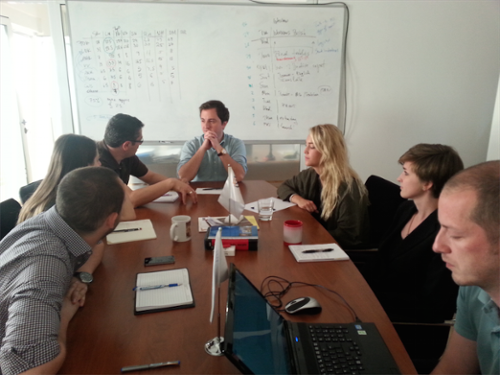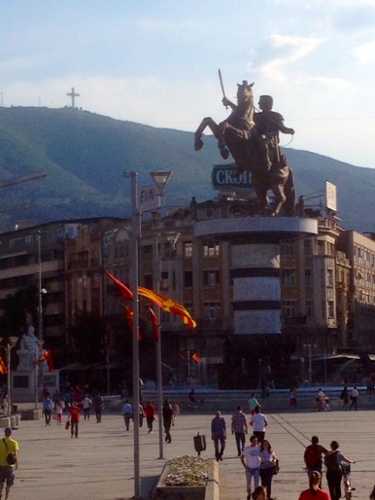Life at D4D

I've made it through one week. All the holes that were empty during the months leading up to the internship are now filling in. I now know where I'm living for the summer, that I can walk to work, that my co-workers are hilarious and genuinely good people, and what I'll be doing this summer at D4D.
My workday on Monday started with a staff meeting. There I learned that I have three projects for the summer: a rule of law and security paper, an electoral adjudication paper, and a political ideology paper. D4D researches and publishes frequently, so I'm basically getting policy papers in those three areas ready for publication. The papers were translated from Albanian, so I do a good amount of textual editing. True to my inner English major, I dearly love editing papers, so I greatly enjoy having an internship that allows me to edit as much as I want. Also, as the papers were written based on information gathered mostly from 2012, I spend most of my time researching to get the papers as up-to-date as possible. This research has led me across the internet, through countless Kosovo government documents and human rights indicator websites. I've also become very acquainted with Google Translate since the information I'm looking for is often in documents written in Albanian. Fortunately my co-worker, Nimi, has been so kind in double-checking Google Translate when I need him to. Not only are my editing and research skills improving, but my boss says that he may put me as a co-author on the publications if I do a good enough job (talk about incentive). I'm going to work as hard as I can, because I never dreamed that I would have the opportunity to have my name on publications this early in my law school career.
The office is busy right now because the government decided only a month or so ago to hold parliamentary elections on June 8 instead of in November. The popular perception is that the party in power will increasingly lose votes during the next few months, so they want to hold elections as soon as possible. Despite the corruption, D4D is doing its best to make these elections as informed and fair as possible. One way they're trying to accomplish this is by politicizing membership-based organizations (MBOs). MBOs are composed of people who are formed together based on their membership in a particular group, such as farmers or beekeepers. For the most part, these groups have yet to identify with a political party, so politicians don't feel pressured to work for MBO interests. Essentially, D4D is hoping the MBOs will turn into interest groups. To help the process, D4D is orchestrating an event between MBOs, politicians, and the media. Political parties will have the opportunity to present their platforms to the MBOs, and MBOs will have the opportunity to question the political parties and express their interests. I'm excited to see how it will turn out.
I wasn't sure what to expect working for a think-tank, but I'm happy that I'll get to be involved in Kosovo's political development apart from just researching and editing. For instance, I'll get to help D4D observe the parliamentary elections in one of Kosovo's seven major cities. I also have opportunities to attend round tables and events all over Kosovo. I almost went to Mitrovica, a city in northern Kosovo where tensions between its Kosovar Albanian and Serb inhabitants still run high, the other day for a conference with government leaders and investors. Unfortunately, I didn't end up going because a high profile war crimes case started in Mitrovica the same day as the conference, so the security situation wasn't ideal. But it looks like I'll have many other opportunities to travel in Kosovo and attend events that will help me learn more about its political development.
Pristina has turned out to be a mecca of international development networking. So far I've met two European Union Rule of Law Mission in Kosovo (EULEX) judges, a EULEX analyst, a local who runs a transitional justice NGO in Kosovo, two Fulbright scholars interested in international development issues, a man who has been working with KFOR (the NATO force in Kosovo) for the past seven years, a woman with USAID, and others. Kosovo is so small that everyone kind of knows everyone in this particular international development community. Another great thing about Kosovo being so small is that it's only a quick hour-drive to Skopje, Macedonia, which means that your boss might invite you to take a quick trip across the border with him and his wife (I love my job).



This week was certainly full, and I can't wait to see what this coming week brings.